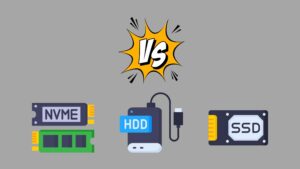

Choosing the right storage type for your server is crucial for optimizing performance and cost-effectiveness. In this article, we’ll delve into the key differences between NVMe, SSD, and HDD storage, equipping you with the knowledge to make an informed decision based on your specific needs.
Hard Disk Drives (HDD)
HDDs, the oldest and most traditional type of storage, utilize spinning platters and moving needles to record data. While they offer the lowest cost per gigabyte, their read-write performance is significantly slower compared to SSDs and NVMe drives. HDDs are suitable for storing large amounts of data at a low cost, but their performance limitations make them less ideal for applications that require high speed and low latency.
Solid State Drives (SSD)
SSDs employ flash memory to store data, eliminating the need for moving parts. This results in significantly faster read-write speeds compared to HDDs. SSDs are a versatile option, offering a balance between performance and affordability. They are well-suited for a wide range of applications, including web hosting, SaaS applications, and database systems.
Non-Volatile Memory Express (NVMe)
NVMe represents the cutting-edge of storage technology, surpassing SSDs in performance. Similar to SSDs, NVMe utilizes flash memory, but it connects directly to the motherboard via the PCI Express (PCIe) interface, bypassing the S-ATA controller bottleneck. This direct connection enables NVMe drives to deliver exceptional read-write speeds and low latency, making them ideal for applications demanding the highest levels of performance.
NVMe vs. SSD vs. HDD: A Quick Comparison
| Feature | NVMe | SSD | HDD |
|---|---|---|---|
| Connection | PCI Express | SATA | SATA |
| Read-write speed | Up to 32 GB/s | Up to 550 MB/s | Up to 270 MB/s |
| Latency | Low | Medium | High |
| Cost per gigabyte | Highest | Medium | Lowest |
| Ideal applications | SaaS apps, database systems, video editing | Web hosting, general-purpose computing | Data storage, backups |
Why NVMe is Significantly Faster
NVMe’s superior performance stems from its direct connection to the motherboard, bypassing the SATA controller. This eliminates a communication bottleneck, allowing NVMe to handle multiple commands simultaneously. Additionally, NVMe utilizes multiple PCIe lanes, further boosting performance.
Applications Benefitting from NVMe
NVMe’s exceptional speed makes it ideal for applications that demand low latency and high throughput, such as:
-
Website hosting: Visitors experience faster response times due to quicker data retrieval.
-
SaaS applications: Users enjoy a smoother and more responsive experience.
-
Database applications: Data collection and retrieval are accelerated.
-
E-commerce software: Product pages load faster, reducing website abandonment rates.
-
Video editing: Editing and exporting video files become significantly faster.
Choosing the Right Storage for Your Needs
When selecting storage for your server, consider the following factors:
-
Performance requirements: If your applications demand high speed and low latency, NVMe is the ideal choice. For moderate performance needs, SSDs offer a balance between performance and cost. HDDs are suitable for storing large amounts of data at a low cost but are not ideal for performance-critical applications.
-
Budget: NVMe drives are the most expensive option, followed by SSDs and HDDs. Determine your budget and choose the storage type that best aligns with your financial constraints.
-
Capacity requirements: Assess the amount of storage space you need. NVMe and SSDs are generally available in lower capacities, while HDDs offer larger capacities at lower cost per gigabyte.
Conclusion
In conclusion, understanding the differences between NVMe, SSD, and HDD storage empowers you to make an informed decision based on your specific performance, budget, and capacity requirements. NVMe reigns supreme in performance, SSDs offer a balance between speed and affordability, and HDDs remain a cost-effective option for storing large amounts of data.
